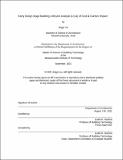Early Design Stage Building Lifecycle Analysis (LCA) of Cost & Carbon Impact
Author(s)
Liu, Jingyi
DownloadThesis PDF (12.13Mb)
Advisor
Norford, Leslie K.
Terms of use
Metadata
Show full item recordAbstract
In my research, I have developed a building lifecycle analysis (LCA) workflow that recommends sustainable solutions based on the optimization of building lifecycle cost ($) and carbon impact (kgCO2eq). The workflow can analyze conceptual geometries in the early design stage when there is limited information. The first part of the workflow recommends sustainable features of building attributes, and the second part recommends detailed construction schemes. By following the recommended design solutions, the workflow helps save on average around 15% on cost, and around 25% on carbon impact in the U.S. Take a medium office building as an example; a 15% cost saving corresponds to around $9 million in the U.S. The workflow also reduces its analysis time to around 30 minutes, whereas analyzing a detailed model using conventional LCA tools takes hours.
This new LCA workflow helps with data-driven design decision-making. It is unique because it ensures both performance and flexibility during the early design stage. As for attribute features, it recommends ranges for numerical attributes and rankings for categorical ones, which allows users to choose their preferred values or options. As for construction schemes, design diversity is quantified to produce various design solutions. The workflow also allows users to customize the minimum and maximum boundaries for numerical attributes and select their favorite categorical options, enabling users to tailor their design needs. The whole workflow is developed in Grasshopper, a code-friendly platform in the conceptual design software Rhino. Cutting-edge technologies are applied, including machine learning, optimization, data analysis, and visualization.
Date issued
2021-09Department
Massachusetts Institute of Technology. Department of ArchitecturePublisher
Massachusetts Institute of Technology